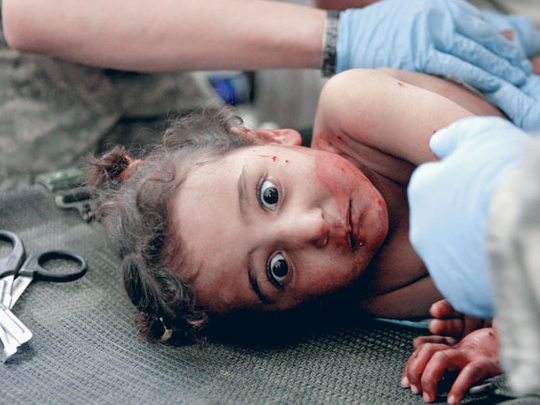
Baghdad: Jaber Abdul Zahra's flashbacks are so vivid he can feel the asphalt against his cheek that night six years ago when he lay pinned to the ground between his two critically wounded brothers, the three of them caught in the crossfire as American troops and local militiamen fought in a Baghdad neighbourhood.
The memory of waiting till dawn for the fighting to subside so he could ferry them to hospital has overshadowed the grief he felt when one brother later died from his wounds. But the 43-year-old computer engineer didn't understand what was causing the flashbacks, or the palpitations and sheer terror that still overcome him whenever he sees people in uniform.
Until he happened to get a contract to hook up the computers at a new centre being set up in the back-yard of the Imam Ali Hospital. There he met psychiatrist Haitham Abdul Razaq and found out he was one of tens of thousands of Iraqis with symptoms of post-traumatic stress disorder, or PTSD.
The mental trauma centre was the first of its kind in Baghdad, part of a new push by Iraq's Health Ministry to help Iraqis deal with the hidden stresses inflicted by the years of violence that followed the 2003 US invasion. In the past year, nine more such centres have opened across Iraq.
Violence
"There is no doubt Iraqis have suffered some of the worst stress and trauma imaginable, but the hardest part is to get people to come here," Abdul-Razaq said. Since opening last Autumn, there have been only 200 patients at the centre, in Baghdad's Shiite slum of Sadr City.
What deepens the problem in Iraq is the duration of the violence and how intertwined it has been with civilian life.
Countless numbers have witnessed car bombings, when all that is left is parts of human bodies strewn about, or have endured the killings or torture of their relatives by militants — similar attacks and violence occur frequently during the seven-year-old conflict, providing triggers for the afflicted to relive their own trauma, said Mohammad Al Uzri, an Iraqi-born psychiatrist based at the University of Leicester, England.
The result goes beyond classical PTSD to something Al Uzri describes as "persistent traumatic stress disorder".
"One man described to me his experience after a car bombing, how the smell of burnt human flesh stayed with him and every time he tried to eat, he couldn't because he would smell that smell," said Al Uzri. The psychiatrist, who left the country in the 1990s, has travelled repeatedly to Iraq as part of a programme run by his Iraqi Mental Health Forum to work with Britain-based psychiatrists to build the capacities of their Iraqi colleagues.
For a population of 28 million, Iraq has only about 160 psychiatrists, whether fully qualified or in training, said Al Uzri. Baghdad's only two psychiatric institutions — the Ibn Rushd clinic, which treats acute psychiatric disorders, and the Al Rashaad hospital, which focuses on chronic psychosis such as schizophrenia — rarely handle disorders related to the stress of war.
The only Iraqi mental health survey so far, conducted in 2006-2007 by the World Health Organisation and Iraq's Health Ministry, showed that over 50 per cent of the population had been exposed to psychological trauma, but only 3.5 per cent developed PTSD.












